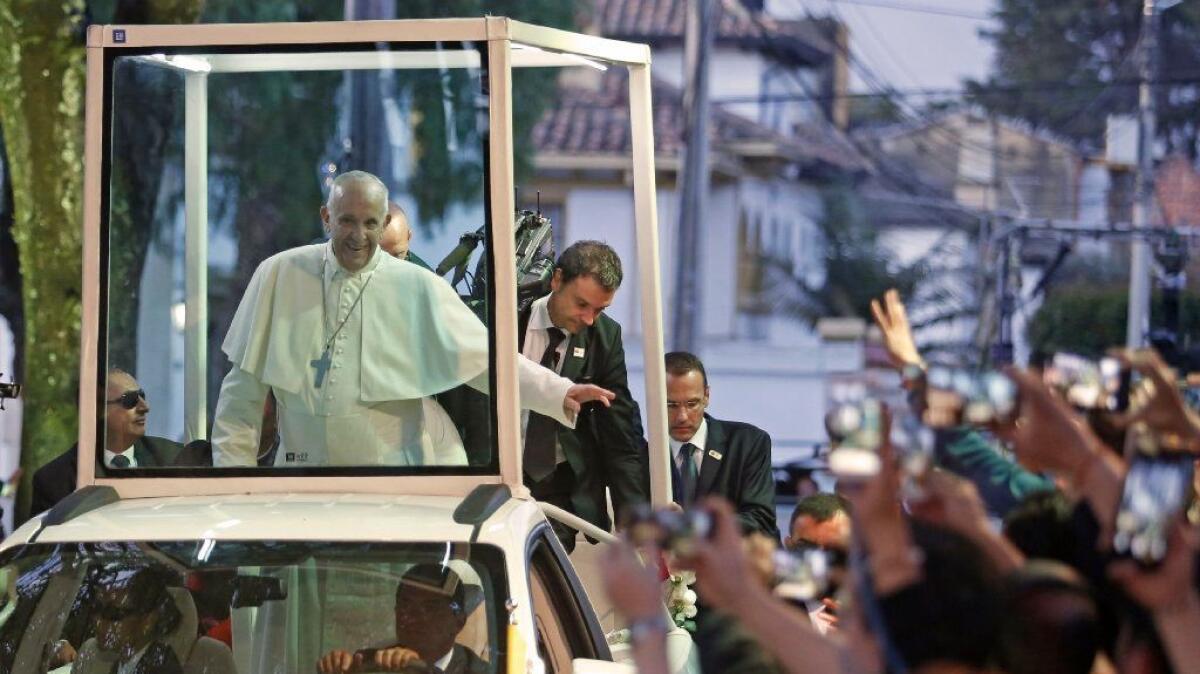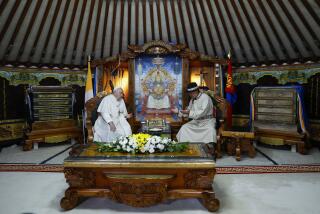Pope Francis arrives for Colombia’s first papal visit since 1986

- Share via
Reporting from BOGOTA, Colombia — Pope Francis arrived in Colombia on Wednesday for the first papal visit since 1986, the beginning of an intense, five-day trip in which he will try to bring a sharply divided nation together in the cause of peace.
The pope’s Alitalia jet touched down at a military base next to Bogota’s El Dorado International Airport and was met by President Juan Manuel Santos, his wife, Maria Clemencia, and Msgr. Ettore Balestrero, the Vatican’s representative in Bogota.
Santos has focused much of his presidency on a peace agreement finalized in December with the Revolutionary Armed Forces of Colombia, or FARC, the largest of several mainly leftist rebel forces that have been at war with the government since the 1960s.
The peace deal ended 52 years of conflict, but its concessions to the rebels have opened sharp divisions in Colombian society, between those willing to forgive the violence of the past and those who insist the agreement’s terms are too generous.
Francis strongly supported the peace initiative without appearing to favor either side or specific deal points. A Vatican spokesman said this week that the pope has long wanted to visit Colombia, with the world’s third-biggest population of Roman Catholics, but wanted to wait until the peace negotiations were completed before making the trip.
In a video message broadcast this week over Colombian TV, Francis said he arrives as a “pilgrim of hope and peace.” In a clear reference to the peace agreement now in its early stages of implementation, he said the motto for his trip is “making the first step.” He said the church is “called to the task of promoting reconciliation.”
Instead of the military honor guard usually summoned to greet visiting heads of state, Francis was met by scores of children from across Colombia, including 11-year-old Emmanuel Rojas, son of Clara Rojas, who was working as an aide to presidential candidate Ingrid Betancourt when they were both kidnapped by the FARC in 2002. Emmanuel was born during his mother’s six-year captivity.
To the strains of classical music played by the Bogota Philharmonic Orchestra, Francis also met with wounded veterans of the police and military hurt by land mines and gunfire.
He then boarded an open popemobile for the eight-mile ride to the Vatican ambassador’s residence where he was to spend the night. He rode in a caravan as ecstatic onlookers strained for a glimpse of the pontiff and waved Colombian flags and white handkerchiefs.
The pope’s formal agenda was to begin Thursday morning with a meeting in the city center with government officials as well as civil society groups.
Other events scheduled included meetings with Santos and leading Latin American bishops, followed by an outdoor Mass, which up to 700,000 were expected to attend.
On Friday, Francis ie expected to fly to Villavicencio, capital of Meta province, where he will conduct Mass and preach reconciliation in an agricultural region that suffered much during Colombia’s long and violent civil conflict. He will also plead for respect for the environment, a primary concern of his papacy.
The pope’s agenda then takes him to Medellin on Saturday where he is expected to encourage youths to take up missionary work and other religious vocations. He will say Mass at the Olaya Herrera international airport, which is being closed to accommodate crowds that could reach 1 million.
The pope will end his trip in Cartagena, the historic walled city that was a center of Spanish colonial rule. In a highly symbolic gesture, he will pay homage at the church dedicated to Colombia’s first saint, Pedro Claver, a Spaniard who, like Francis, is a Jesuit. In the 17th century, Claver ministered to slaves arriving after suffering horrible conditions on ships from Africa.
A Vatican spokesman downplayed any possibility the pope would comment on the state of affairs in neighboring Venezuela, which has been ripped apart in recent months by violent demonstrations that have left more than 130 dead. Tens of thousands of Venezuelans have fled the country in recent months to escape a collapsed economy and scarcities of food, medicine and economic opportunities.
Kraul is a special correspondent.
More to Read
Sign up for Essential California
The most important California stories and recommendations in your inbox every morning.
You may occasionally receive promotional content from the Los Angeles Times.













